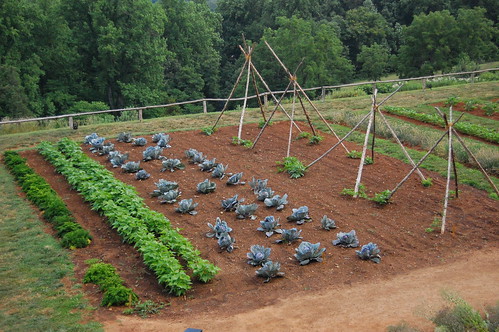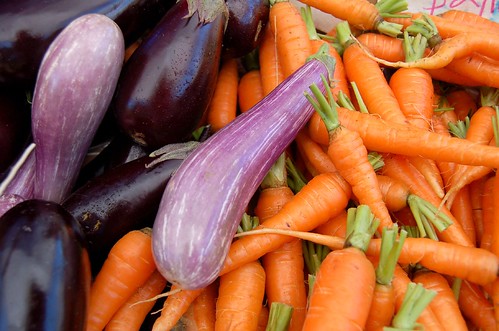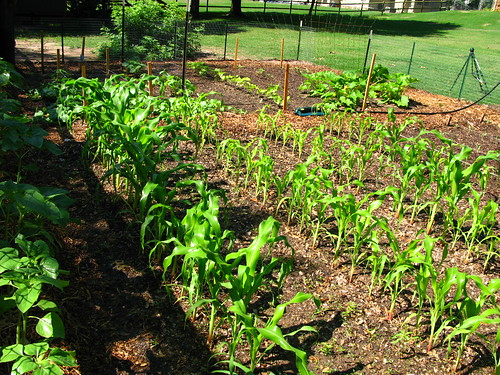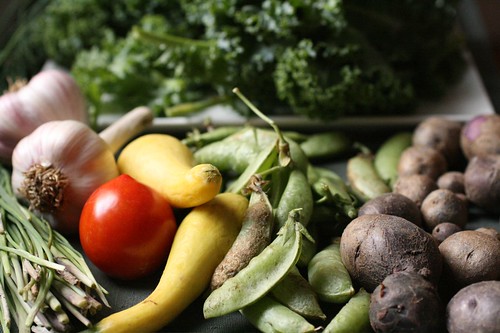Showing posts with label organic. Show all posts
Showing posts with label organic. Show all posts
Eating Organic Fruits And Vegetables For More Energy
Eating Organic Fruits And Vegetables For More Energy

When you grow your own garden - they are much fresher and you can get your full vitamins and minerals. When you cook your vegetables - you do not cook them until they are soggy and wept. This will bring out the best in your vegetable. Having your vegetable a little raw bring out the vitamins and minerals better. For which in turn you will get more energy from them.
Now, when you grow your own fruit, you dont get the chemicals that is sprayed on them to preserve them like at the market. You will taste the difference if you do a taste test like I did. To do the test just buy some fruit from the store and after you have grown your own fruit then of course taste it to the store bought.
You will find that the fruits and vegetables are much better. With that being said, you will eat even more from your organic garden. The more you eat the more energy you will have.
There is a book that I read named "Family Organic Garden." Family Organic Garden is a complete and fully illustrated guide that explains in easy steps how to grow an organic food garden. Family Organic Garden provides new gardeners all the information they need to know to grow successfully their own food, save money and become healthier.
Photo attribution Southern Foodways Alliance

Eating Organic Fruits And Vegetables For More Energy
Organic Gardening Video Tips 2
Organic Gardening Video Tips 2

Organic pest control - Natural bug and insect repellents
Soil Testing the Easy Way
Soil Test Kit and How To
How To Make an Indoor Worm Compost Bin

Organic Gardening Video Tips 2
Organic Food and Locally Grown Food Are They the Same
Organic Food and Locally Grown Food Are They the Same

Making the Case for Local Organic Food
Those on one side of the debate insist it doesnt matter where organic food is grown; rather, the crucial factor is that the food meets stringent standards to ensure that it is truly organic. Those on the other side of the debate are equally vehement that locally grown organic food is preferable to imported organic food, both because the fossil fuels used to transport imported organic food add to global warming and because UK organic food supports local farmers.
Advocates say that you can find UK organic food at an organic farm shop, or even arrange for organic food delivery right to your door. You can even find organic fish, such as organic trout from an organic fish farm. There, the organic trout may live in 400-year-old spring water and eat natural shrimp that comes from organic watercress beds.
Those who favor importing organic food point out that an organic farm shop will only have seasonal foods, which severely limit the choices consumers have when preparing meals. Imported organic food, they say, retains its superior nutritional quality while delivering a bountiful variety of fruits and vegetables.
Some people, of course, take the middle ground, and opt to select their foods from an organic farm shop when what they desire is in season and shop for imported organic food the remainder of the year.
The Bottom Line
People may differ in their opinions about whether or not to limit ones consumption of organic food to that grown locally, but virtually everyone agrees that organic fruits, organic vegetables, organic fish, and organic meats are preferable to those that are grown with chemical fertilizers, insecticides, and fungicides.
Currently, non-organic growers are authorized to use over 1,000 chemicals on crops. This translates into everything from soil erosion due to over-farming to dangerous toxic runoff into our drinking water. Growing food organically is a way to reverse this trend. With over 700,000 hectares dedicated to UK organic food, farmers are trying to meet consumer demand. Still, some markets import almost half of the organic food they sell. As for who will win the debate over locally grown organic food vs. imported organic food, only time will tell.

Organic Food and Locally Grown Food Are They the Same
Organic Gardening for Beginners You Can Start An Organic Garden Too!
Organic Gardening for Beginners You Can Start An Organic Garden Too!

As you may have knew or guessed it, organic gardening does not involve the use of chemical fertilizers which reduces the risk of Cancer, Birth Defects, Infertility and many other health problems.
Many know of such problems but they do not want to prevent it UNTIL it happens to them. Sad, isnt it? You may argue that money is important than health or equally important.
What Im trying to convey is, dont wait till the problem happens to you and then prevent it but prevent it before it happens to you. I hope Im not confusing you. That is why I would say go organic now.
I cant stress the importance with words.
To learn how to start your own organic garden with detailed step-by-step guide within weeks, click on the link below because even you as a beginner can start an organic garden too!
As you see in the photo above you can have your vegetable garden as big or as small as you want it to be.
==> http://bit.ly/i4pQIZ
Vegetable Garden photo by Salvadonica, Chianti, Tuscany

Organic Gardening for Beginners You Can Start An Organic Garden Too!
Why Eating Organic Foods Is Good
Why Eating Organic Foods Is Good

Dr. Alan Greene of Stanfords Childrens Hospital neatly summarizes the argument for organics: "Eat organic produce. Your immune system wont waste energy trying to fight off the toxins that are sprayed on conventional fruits and vegetables." Eating organics frees up your immune system and antioxidants to do their evolutionarily evolved job, which is to fight off pathogens, cancer, and other diseases originating from natural environmental sources. Your bodys natural defense mechanisms are incredible strong, but like anything else, they can only handle so much attack. To keep your defensive line from being spread too thin, you should therefore limit exposure to toxins (and stress) as much as possible. Its important to realize that consuming pesticides and herbicides — even if they have not been found to be directly cardinogenic — can, in effect, lead to cancer if they use up your supply of antioxidants, which would otherwise have prevented cancer that was generated from another source.
Its true that organic foods typically cost more than conventional, but this may be true only in the short-term. After you adopt a healthier lifestyle with healthier food choices, including organics, you may find yourself frequenting the doctors office much less and spending less on medications — over the counter and prescriptions — and not to mention a lower chance of being prematurely dead. Its important to know that organically produced foods have to meet rigorous governing regulations in all aspects of production. Its labor and management-intensive, usually produced on smaller farms, which dont benefit from economies of scale. These factors combine, causing the cost to be higher. But as the saying goes, "you get what you pay for."
Organics typically cost about twice as much as conventionally produced food. To put things in perspective, consider bottled water. I know many people who would just about die of thirst before drinking tap water; for them, its bottled or nothing. But when you do the math, bottled water is about 300-600 times more expensive than tap water, and for good reason. But, depending on which municipality you live in, your tap water might actually be safer and healthier than eating conventionally produced foods. It really doesnt make sense to spend money on bottled water and then eat foods that are not grown organically.
Some of the many benefits of eating organic foods are:
Superior nutrition: Organics have up to 300% more vitamins and minerals than conventionally grown foods.
They have greater flavor. Many top chefs use only organic foods.
Reduced intake of chemicals and heavy metals.
Decreased exposure to carcinogens.
Better working conditions for farmers and workers.
No genetically modified organisms (GMOs).
Much better for the environment.
For more information on organics, visit www.ota.org
I only buy organic. The most disappointing thing to me is that most restaurants dont use organic food, due to the higher cost. However, if customers demanded organic, more producers would produce it, and prices would come down. So, start voting with your dollar. When you go to a restaurant and youre paying the bill, take a moment to fill out the comment card, or write directly on to the receipt, that you would eat there more often if they offered some organic foods. This is how we begin to make a difference.
If you need some recipes books on how to make raw organic foods recipes or how to add raw food recipes to your diet or menu, this would be the best place to begin.
Photo attribution Martin Cathrae

Why Eating Organic Foods Is Good
Organic Farmers Lose in USDA
Organic Farmers Lose in USDA

Alfalfa is one of the most widely used forage crops for dairy and beef farmers around the world. The ruling by USDA Secretary Tom Vilsack provided no restrictions against planting GMO alfalfa next to organic crops. This substantially increases the risk of cross-contamination given that alfalfa is pollinated by bees and other insects.
The USDA’s decision ignited an outcry within the U.S. organic community. “Organic and others are now left, once again, having to take all the precautions while biotech takes little responsibility,” said Liana Hoodes, director of the National Organic Coalition.
“We’re disappointed with USDA’s decision and we will be back in court representing the interest of farmers, preservation of the environment and consumer choice” said Andrew Kimbrell, executive director for the Center for Food Safety.
“Last spring more than 200,000 people submitted comments to the USDA highly critical of the substance and conclusions of its Draft EIS on GE Alfalfa,” added Kimbrell. “Clearly the USDA was not listening to the public or farmers but rather to just a handful of corporations.”
As Christine Bushway, executive director of the Organic Trade Association (OTA), sees it, deregulation of GMO alfalfa threatens the growing organic industry. “Preserving market and farmer choice and agricultural diversity are central to USDA’s mission and the future of rural American livelihoods,” Bushway said. “This failure to do so will make it increasingly difficult to meet the growing demand for U.S. organic crops.”
Alfalfa decision threatens growing organic industry.
According to the OTA, the U.S. organic industry generates $26.6 billion a year in product sales and employs tens of thousands of people around the country. The organic industry supports at least 14,540 family farms operating in rural areas.
“Unrestricted commercialization of genetically engineered crops—86 percent of the country’s corn and 93 percent of soybeans—has resulted in widespread unlabeled presence of GE (genetically engineered) materials in mainstream food products unbeknownst to the average consumer,” the OTA reports. According to California’s Department of Food and Agriculture, at least 70 percent of processed foods in American supermarkets now contain GMO ingredients.
More than 20 million acres of alfalfa are grown in the United States, making it the country’s fourth-largest crop by acreage, behind corn, soybeans and wheat, The New York Times reports.
About 1 percent of alfalfa grow in the United States is organic.
Sources : NewHope360 written by Carlotta Mast and Herb Botany

Organic Farmers Lose in USDA
Eat Organic Food for a Healthier Fitter You!
Eat Organic Food for a Healthier Fitter You!

How do you ensure that you have enough energy to last the day, not skip a day or two at work, or even spend some quality time with your loved one or your entire family? Well, that’s easy! Simply eat well. Go natural and switch to a healthy, wholesome, organic diet to ensure a healthier, fitter you.
Benefits of Organic Food
Organic food has a myriad of health benefits. By eating natural, wholesome food, you give your body everything it needs, and keep away the harmful things that it doesn’t. Organic food is devoid of marsh artificial flavors, preservatives, and other such dangerous substances. These range from unnecessary pesticides and fertilizers used to grow fruits and vegetables to strong preservatives and artificial flavors usually used in junk food.
The other thing that’s really great about organic food is that it is safer and gentler on the environment. Since organic food is grown and made naturally, it uses fewer harmful, non-degradable chemicals and materials. Organic, “green” food also tastes much better, has flavors and that are more stronger, and is completely nutritious in every bite.
Eat Organic Meals
Organic food is now amazingly easy to procure and consume. My favorite organic food source is TheNaturalStore.com, a veritable treasure trove for mouth-watering organic treats, ranging from organic snacks and meals to natural spices and seasoning.
For a healthier and fitter life, try the organic milk shakes and fruit juices. The GeniSoy Soy Protein Shake in Chocolate Flavor is a delicious, healthy shake just right to give you the energy to take on the day. The Designer Whey 100% Whey Protein in Strawberry Flavor is another lip-smacking drink after a long day, or just when you are beginning it.
Organic meals don’t have to be bland and tasteless. Try the Lundberg Creamy Parmesan Risotto as a deeply satisfying and nourishing meal. Organic meals like the Thai Kitchen Rice Noodle Bowl with Spring Onion not only indulge your senses, but also give you vigor and strength.
If you are frequently on the move, you can carry easy-to-eat, tasty snacks like the scrumptious Eden Foods Dry Roasted Pumpkin Seeds. The Revolution Foods Organic Mash Ups (4 Pouches, Berry) is another wholesome, easy snack. The Natures Choice Multigrain Cereal Bars are perfect for a healthy, quick snack too. These crunchy, quick snacks are ideal for picking and keeping in your office bag to ensure you have access to a quick, healthy, energy boost when you’re working.
Organic soups, coffee and tea are a great way to share your healthy lifestyle with your friends and family when you have a quiet evening in. The Mount Hagen Organic-Cafe Coffee is an organic, deeply aromatic coffee with an extremely soothing brew. Annie Chuns All Natural Asian Cuisine Korean Kimchi Soup Bowl is ideal for relaxing with friends and family over a bowl of hot, nourishing soup.
Invest in Good Health
By choosing to eat wholesome, natural food and organic meals, you can ensure life-long good health for you and your loved ones.
By John Menon
Author’s Bio:
John is an organic food enthusiast. He does her best to ensure his children eat healthy, natural meals and snacks, with the odd eating out trip. He is a regular visitor and shopper at TheNaturalStore.com. He especially loves their milkshakes and breakfast cereal.
Source: PopularArticles.com/article251029
Photo attribution Mike Haller

Eat Organic Food for a Healthier Fitter You!
Organic Food Gardening Basics
Organic Food Gardening Basics

Before planning to start an organic garden, few basics have to be understood by every beginner. The biggest advantage in doing organic gardening is that it requires less maintenance, less time and cost. By understanding few guidelines and with the help of some basic advice any person can start organic gardening.
The first important thing needs to be considered for planning an organic garden is soil. The soil meant for the organic gardening must be healthy. One must testify the soil from a recognized soil lab before it is being used for the organic gardening. The Soil experts test the soil and will give you assurance about the quality of the soil and whether it can be used or not. Next step towards organic gardening is adding nutrients to the soil such as organic fertilizers etc.
One the most important nutrients that should be added to the soil are compost. The compost can be prepared in our garden or can be purchased from the market. There are some techniques for selecting the best compost; the fast compost is the most popular. By using fast composting technique the soil gets prepared within six to eight weeks. The other techniques of compost consume lot of time, so fast composting is recommended.
Tilling of the soil is done after the soil is ready for use. One can go for the option to till soil by hand or use technology like Machines. Hand tilling is considered much effective. After the soil has been tilled, next step is to sow the garden with organic seeds.
The last step is controlling those weeds and pests by using insecticides, organic pesticides and herbicides. All these above steps and guidelines can be further known by visiting the site myorganicfoodgarden.com that shares some more tips on growing your own healthy organic garden. Remember having an organic garden is not only risk free from harmful chemicals but also healthier to the body. So, why not visit the site and gather further information about organic food gardening.
photo source Oakley Originals

Organic Food Gardening Basics
Exactly What is Congress Organic Standards
Exactly What is Congress Organic Standards

The word “organic” seems simple enough but can be confusing for consumers. Here is an inside look at the standards and laws governing this important group of products, particularly tea.
What exactly determines if a product is grown organically?
In 1990, Congress passed the Organic Food Production Act (OFPA) requiring the U.S. Department of Agriculture (USDA) to develop national organic standards. The National Organic Program (NOP) and OFPA developed regulations requiring products labeled “organic” originate from farms, or handling facilities, that are certified by either State or private agencies that have been accredited by the USDA.
The regulations further state that farms, or handling facilities may not use any of the following in production or handling;
•Genetic Engineering
•Ionizing Radiation
•Sewage Sludge
Organic crops must be grown without the use of;
•Most conventional pesticides
•Petroleum based fertilizers
•Sewage sludge-based fertilizers
How are imported organic products regulated?
•The USDA is required by OFPA to review the certification programs under which imported organic products are produced.
•Certifying agents in foreign countries must apply for USDA certification.
•In lieu of USDA certification, foreign governments can assess and accredit certifying agents, under NOP requirements, with USDA approval.
•An equivalency agreement negotiated between the US and a country’s government may also be used in lieu of certification.
What are “organic” labeling standards?
Organic labeling is the simplest part of the certification process and the aspect that is most confusing for consumers. While many times “organic” on a label means you pay more, what is the meaning behind the label? The standards are based on the percentage of organic ingredients in a product, and by law must be identified like this;
•Products labeled “100 % organic” must contain only organically produced ingredients.
•Products labeled “organic” must consist of at least 95% organically produced ingredients.
•Both may display the USDA Organic Seal.
•Processed products that contain at least 70% organic ingredients can only use the phrase “made with organic ingredients”.
•Processed products that contain less than 70% organic ingredients cannot use the term “organic” other than to identify the specific ingredients, on the ingredients list, that are organically produced.
So what does all this mean to US tea consumers? Since tea is grown outside of the US certification is almost always done by foreign agents. It has become increasingly important for consumers concerned about how their teas are grown to be comfortable with their tea supplier. Bio terrorism laws have impacted tea importation by looking more closely overall at what and who are importing products into this country, particularly food products. While these laws can sometimes impede the smooth flow of tea to us from overseas it may be beneficial overall to consumers due to the “closer look” of the FDA.
Converting gardens and estates to organic farming is a costly and lengthy process and sometimes not even a consideration for small farmers. In some cases farmers are already doing a lot right, but lack the knowledge or funding necessary to become certified. There is an effort by the US tea industry to educate growers on the benefit both economically and ecologically for growing teas organically.
Quality, from a taste perspective, has been an issue with organic teas. Gardens converting to organic farming have challenges, short and long term, producing teas that taste as good. As processes continue to improve an d farmers gain more experience, quality and taste are improving.
As an importer and supplier of premium teas one of our major responsibilities is knowing the production standards and philosophies of the gardens we work with. Securing quality, organic teas with outstanding taste characteristics can be challenging but more become available each season.
photo by Bernt Rostad
Tweet

Exactly What is Congress Organic Standards
Organic Gardening For Beginners
Organic Gardening For Beginners

One of the main things I remembered her teaching me was to always eat fresh fruits and vegetables. For which it is now called, organic food. Here are some of the benefits and what you need to do to start your own organic garden.
What you need to do before you begin your organic garden
1. You need to decide how big you want your garden to be.
2. Try not to make it no more than you can handle by yourself.
3. And this is very important!
You need to find the best place that has the most sunlight. The more sunlight the bigger and juicier your plants will be.
4. You need to find out if the soil you are going to grow your garden in is rich soil. If not then you will have to buy top soil to mix with your soil. You can always make a bed or buy sturdy 6 mil plastic - pre-punched drainage bag with holes.
This sometimes is easier, you just fill with grow media, plant your seeds and your garden is ready to go! Depending on how much space you are using depends on how many bags you will need.
5. Decide what is going to be in your garden. Tomatoes, onions, carrots, string beans and so on.
Organic garden tools you will need
In this Essential Garden Tools video you will see a bunch of tools you might not need if your doing a small garden.
Benefits from an organic garden
1. Save money! It is much cheapper to grow your own fruits and vegetable than it is to buy from the super market. No middle man and seeds can be as little as five cents.
2. Fresh fruit and vegetables. NO chemicals or prservatives.
3. Healthy. When you eat organic food. It helps ever cell in your body. From your hair to your toe nails.
Take a look at the other videos on the side bar for more tips and there are helpful introduction ebooks as well.
To your organic gardening success,
Bronzi
photo source thebittenword.com

Organic Gardening For Beginners